PUBLICATIONS
Welcome to the Publications section of the Hanse Parlament. Here, you will find an extensive collection of our research, reports, and insights focused on fostering innovation, entrepreneurship, and vocational education within the Baltic Sea Region. Our publications cover a wide range of topics, from integration of migrants into the labor market to the development of dual vocational training programs and support for female entrepreneurship. Dive into our publications to explore the knowledge and experiences that drive economic growth and social development across the region.
INTACT – Integration of newly arrived migrants by means of competency assessment and high-quality further vocational training
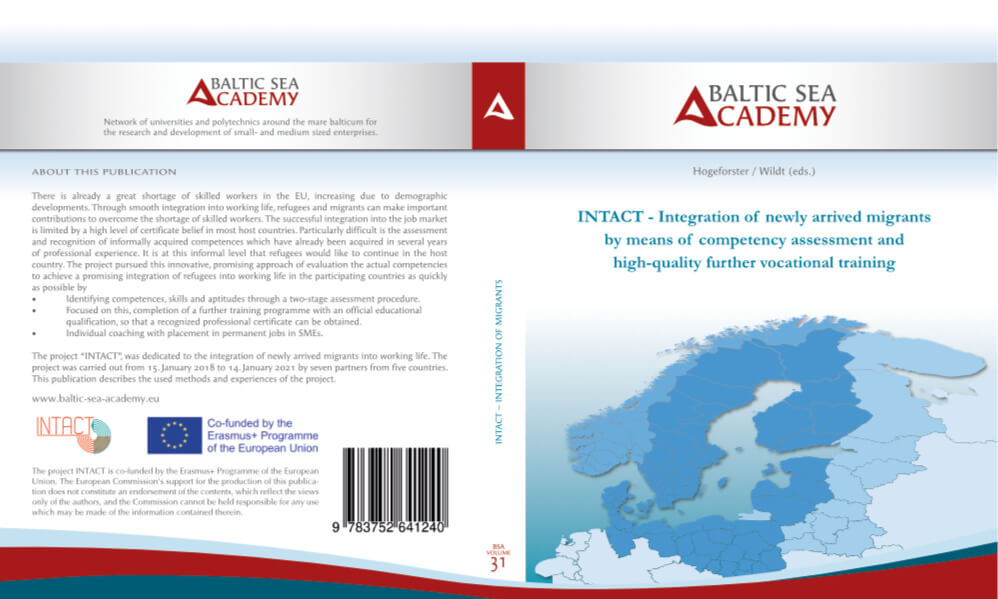
There is already a great shortage of skilled workers in the EU, increasing due to demographic developments. Through smooth integration into working life, refugees and migrants can make important contributions to overcome the shortage of skilled workers. The successful integration into the job market is limited by a high level of certificate belief in most host countries. Particularly difficult is the assessment and recognition of informally acquired competences which have already been acquired in several years of professional experience. It is at this informal level that refugees would like to continue in the host country. The project pursued this innovative, promising approach of evaluation the actual competencies to achieve a promising integration of refugees into working life in the participating countries as quickly as possible by:
- Identifying competences, skills and aptitudes through a two-stage assessment procedure.
- Focused on this, completion of a further training programme with an official educational qualification, so that a recognized professional certificate can be obtained.
- Individual coaching with placement in permanent jobs in SMEs.
The project “INTACT”, was dedicated to the integration of newly arrived migrants into working life. The project was carried out from 15. January 2018 to 14. January 2021 by seven partners from five countries. This publication describes the used methods and experiences of the project.
New Skills for new Entrepreneurs – Attraction and Qualification of Refugees as Successors
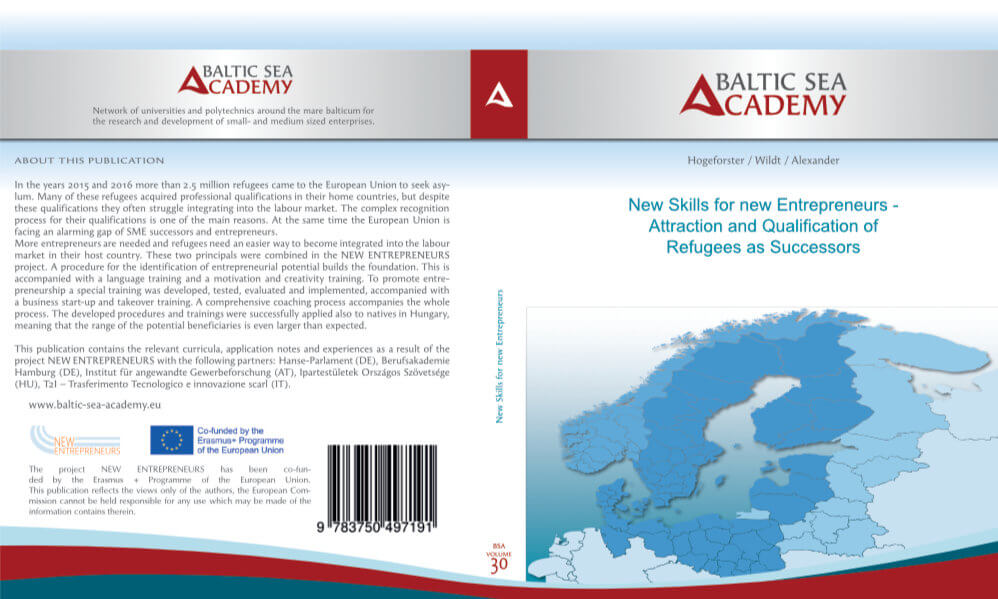
In the years 2015 and 2016 more than 2.5 million refugees came to the European Union to seek asylum. Many of these refugees acquired professional qualifications in their home countries, but despite these qualifications they often struggle integrating into the labour market. The complex recognition process for their qualifications is one of the main reasons. At the same time the European Union is facing an alarming gap of SME successors and entrepreneurs. More entrepreneurs are needed and refugees need an easier way to become integrated into the labour market in their host country. These two principals were combined in the NEW ENTREPRENEURS project. A procedure for the identification of entrepreneurial potential builds the foundation. This is accompanied with a language training and a motivation and creativity training. To promote entrepreneurship a special training was developed, tested, evaluated and implemented, accompanied with a business start-up and takeover training. A comprehensive coaching process accompanies the whole process. The developed procedures and trainings were successfully applied also to natives in Hungary, meaning that the range of the potential beneficiaries is even larger than expected. This publication contains the relevant curricula, application notes and experiences as a result of the project NEW ENTREPRENEURS with the following partners: Hanse-Parlament (DE), Berufsakademie Hamburg (DE), Institut für angewandte Gewerbeforschung (AT), Ipartestületek Országos Szövetsége (HU), T2I – Trasferimento Tecnologico e innovazione scarl (IT).
Bachelor & Meister Dual Bachelor’s study courses with integral attainment of a Bachelor’s degree and vocational Master qualification
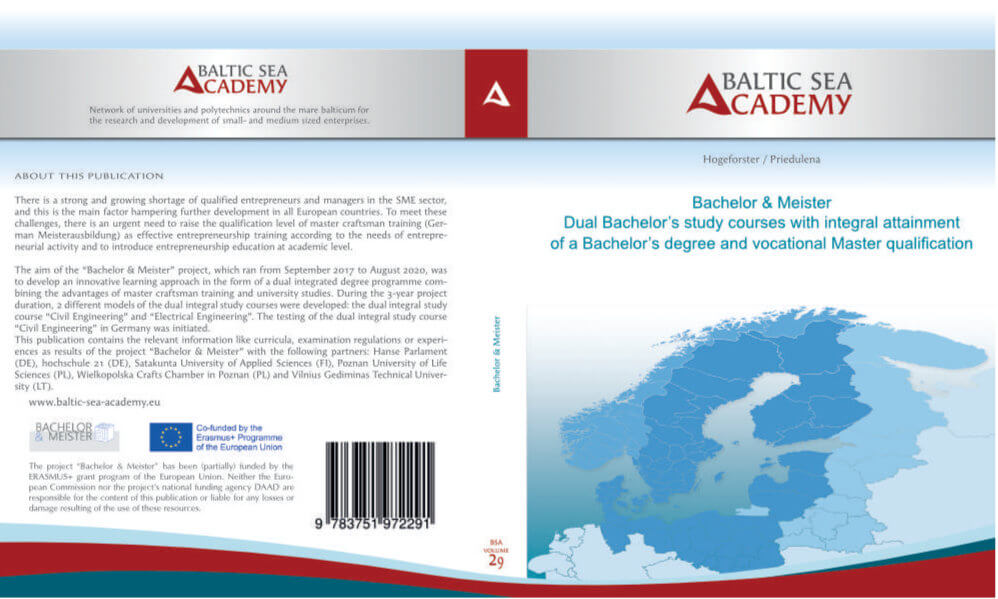
There is a strong and growing shortage of qualified entrepreneurs and managers in the SME sector, and this is the main factor hampering further development in all European countries. To meet these challenges, there is an urgent need to raise the qualification level of master craftsman training (German Meisterausbildung) as effective entrepreneurship training according to the needs of entrepreneurial activity and to introduce entrepreneurship education at academic level. The aim of the “Bachelor & Meister” project, which ran from September 2017 to August 2020, was to develop an innovative learning approach in the form of a dual integrated degree programme combining the advantages of master craftsman training and university studies. During the 3-year project duration, 2 different models of the dual integral study courses were developed: the dual integral study course “Civil Engineering” and “Electrical Engineering”. The testing of the dual integral study course “Civil Engineering” in Germany was initiated. This publication contains the relevant information like curricula, examination regulations or experiences as results of the project “Bachelor & Meister” with the following partners: Hanse Parlament (DE), hochschule 21 (DE), Satakunta University of Applied Sciences (FI), Poznan University of Life Sciences (PL), Wielkopolska Crafts Chamber in Poznan (PL) and Vilnius Gediminas Technical University (LT).
Establishment of two-stage industry competence centers of vocational education and training
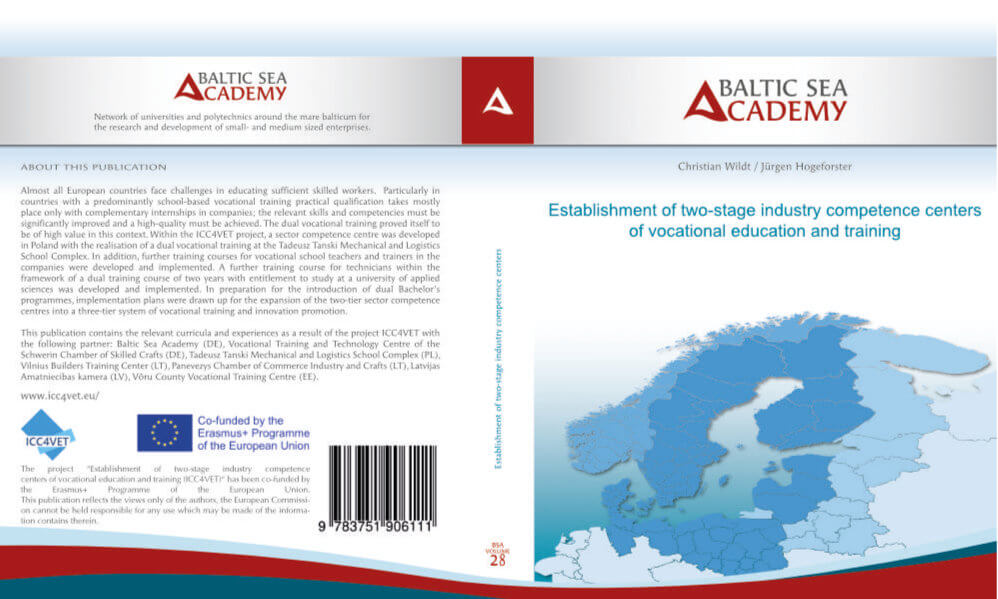
Almost all European countries face challenges in educating sufficient skilled workers. Particularly in countries with a predominantly school-based vocational training practical qualification takes mostly place only with complementary internships in companies; the relevant skills and competencies must be significantly improved and a high-quality must be achieved. The dual vocational training proved itself to be of high value in this context. Within the ICC4VET project, a sector competence centre was developed in Poland with the realisation of a dual vocational training at the Tadeusz Tanski Mechanical and Logistics School Complex. In addition, further training courses for vocational school teachers and trainers in the companies were developed and implemented. A further training course for technicians within the framework of a dual training course of two years with entitlement to study at a university of applied sciences was developed and implemented. In preparation for the introduction of dual Bachelor’s programmes, implementation plans were drawn up for the expansion of the two-tier sector competence centres into a three-tier system of vocational training and innovation promotion. This publication contains the relevant curricula and experiences as a result of the project ICC4VET with the following partner: Baltic Sea Academy (DE), Vocational Training and Technology Centre of the Schwerin Chamber of Skilled Crafts (DE), Tadeusz Tanski Mechanical and Logistics School Complex (PL), Vilnius Builders Training Center (LT), Panevezys Chamber of Commerce Industry and Crafts (LT), Latvijas Amatniecibas kamera (LV), Võru County Vocational Training Centre (EE).
BaltSe@nior – Challenges and innovative solutions in product development for seniors’ home living
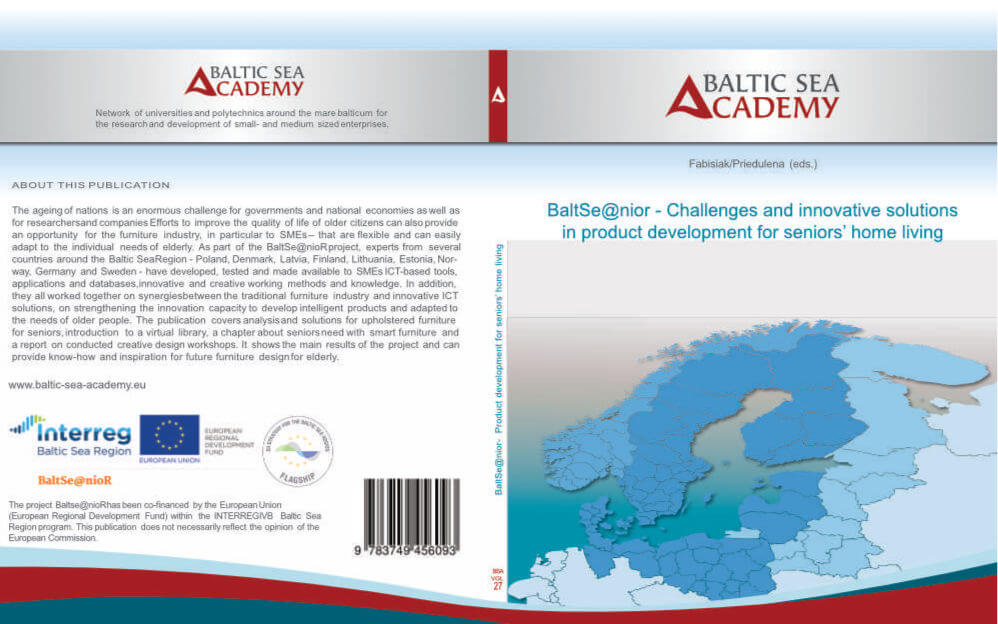
The ageing of nations is an enormous challenge for governments and national economies as well as for researchers and companies Efforts to improve the quality of life of older citizens can also provide an opportunity for the furniture industry, in particular to SMEs – that are flexible and can easily adapt to the individual needs of elderly. As part of the BaltSe@nior project, experts from several countries around the Baltic Sea Region – Poland, Denmark, Latvia, Finland, Lithuania, Estonia, Norway, Germany and Sweden – have developed, tested and made available to SMEs ICT-based tools, applications and databases, innovative and creative working methods and knowledge. In addition, they all worked together on synergies between the traditional furniture industry and innovative ICT solutions, on strengthening the innovation capacity to develop intelligent products and adapted to the needs of older people. The publication covers analysis and solutions for upholstered furniture for seniors, introduction to a virtual library, a chapter about seniors need with smart furniture and a report on conducted creative design workshops. It shows the main results of the project and can provide know-how and inspiration for future furniture design for elderly.
Further Vocational Training Energy Service Manager
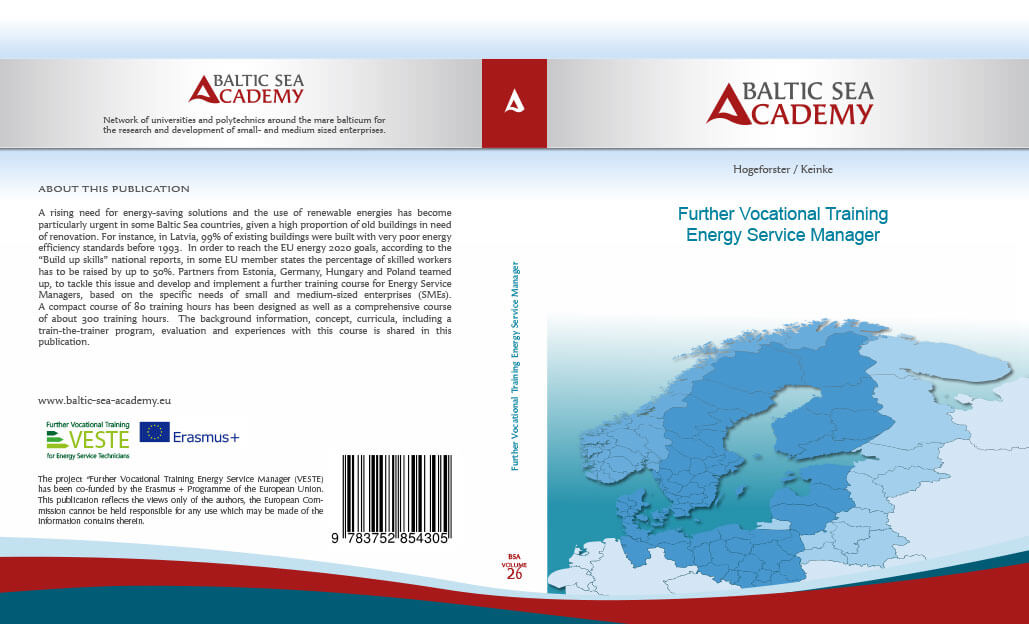
A rising need for energy-saving solutions and the use of renewable energies has become particularly urgent in some Baltic Sea countries, given a high proportion of old buildings in need of renovation. For instance, in Latvia, 99% of existing buildings were built with very poor energy efficiency standards before 1993. In order to reach the EU energy 2020 goals, according to the “Build up skills” national reports, in some EU member states the percentage of skilled workers has to be raised by up to 50%. Partners from Estonia, Germany, Hungary and Poland teamed up, to tackle this issue and develop and implement a further training course for Energy Service Managers, based on the specific needs of small and medium-sized enterprises (SMEs). A compact course of 80 training hours has been designed as well as a comprehensive course of about 300 training hours. The background information, concept, curricula, including a train-the-trainer program, evaluation and experiences with this course is shared in this publication.
Common Vocational Training to Master craftsman in the Baltic Sea Region
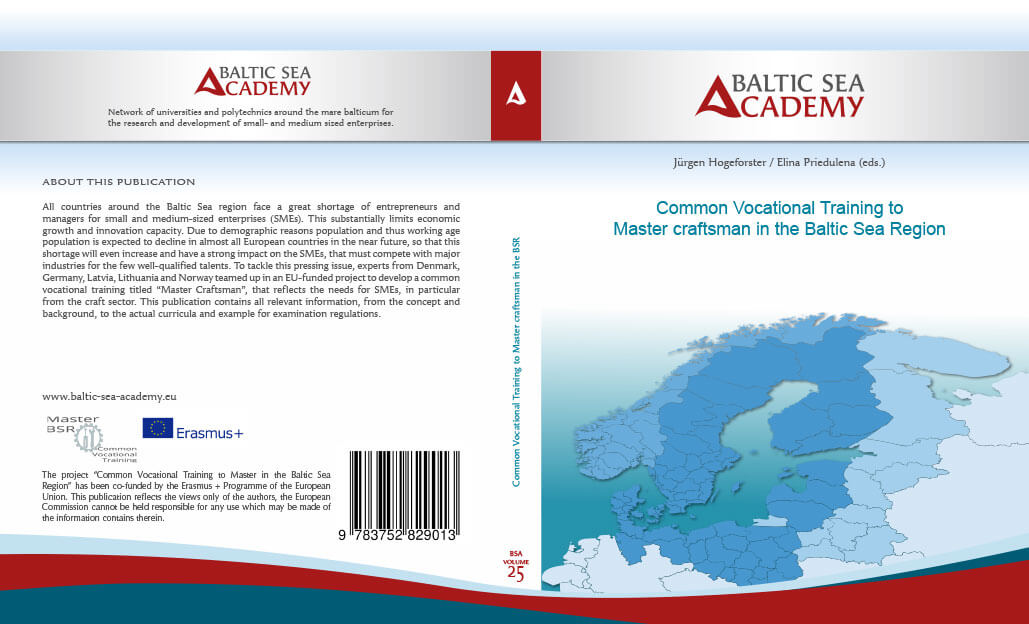
All countries around the Baltic Sea region face a great shortage of entrepreneurs and managers for small and medium-sized enterprises (SMEs). This substantially limits economic growth and innovation capacity. Due to demographic reasons population and thus working age population is expected to decline in almost all European countries in the near future, so that this shortage will even increase and have a strong impact on the SMEs, that must compete with major industries for the few well-qualified talents. To tackle this pressing issue, experts from Denmark, Germany, Latvia, Lithuania and Norway teamed up in an EU-funded project to develop a common vocational training titled “Master Craftsman”, that reflects the needs for SMEs, in particular from the craft sector. This publication contains all relevant information, from the concept and background, to the actual curricula and example for examination regulations.
Qualification and integration of young people through dual vocational training
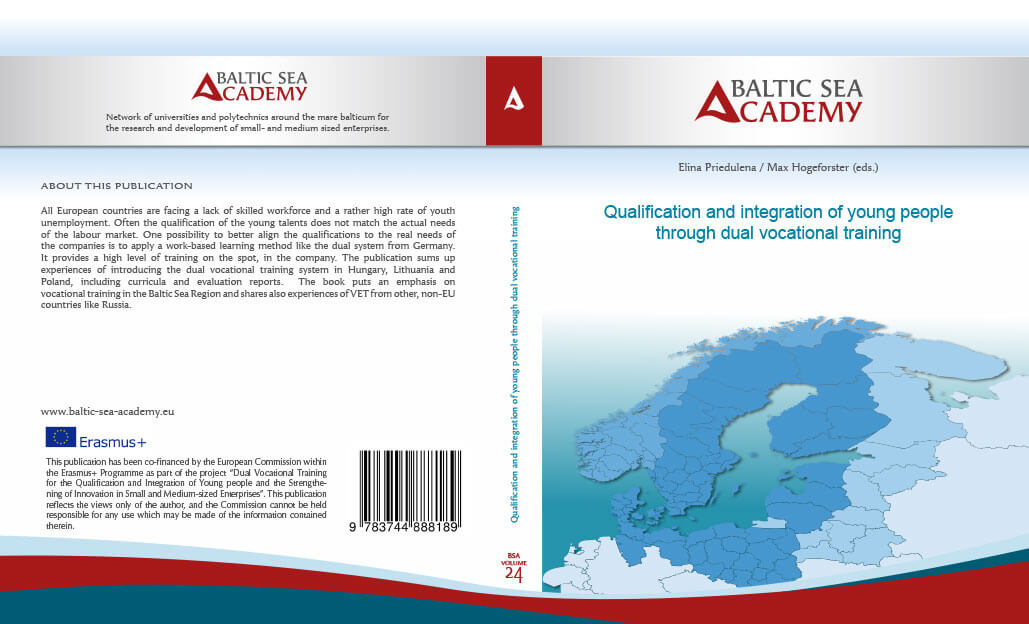
All European countries are facing a lack of skilled workforce and a rather high rate of youth unemployment. Often the qualification of the young talents does not match the actual needs of the labour market. One possibility to better align the qualifications to the real needs of the companies is to apply a work-based learning method like the dual system from Germany. It provides a high level of training on the spot, in the company. The publication sums up experiences of introducing the dual vocational training system in Hungary, Lithuania and Poland, including curricula and evaluation reports. The book puts an emphasis on vocational training in the Baltic Sea Region and shares also experiences of VET from other, non-EU countries like Russia.
Improvement of Skills in the Green Economy through the Advanced Training Programs on Cradle to Cradle ®
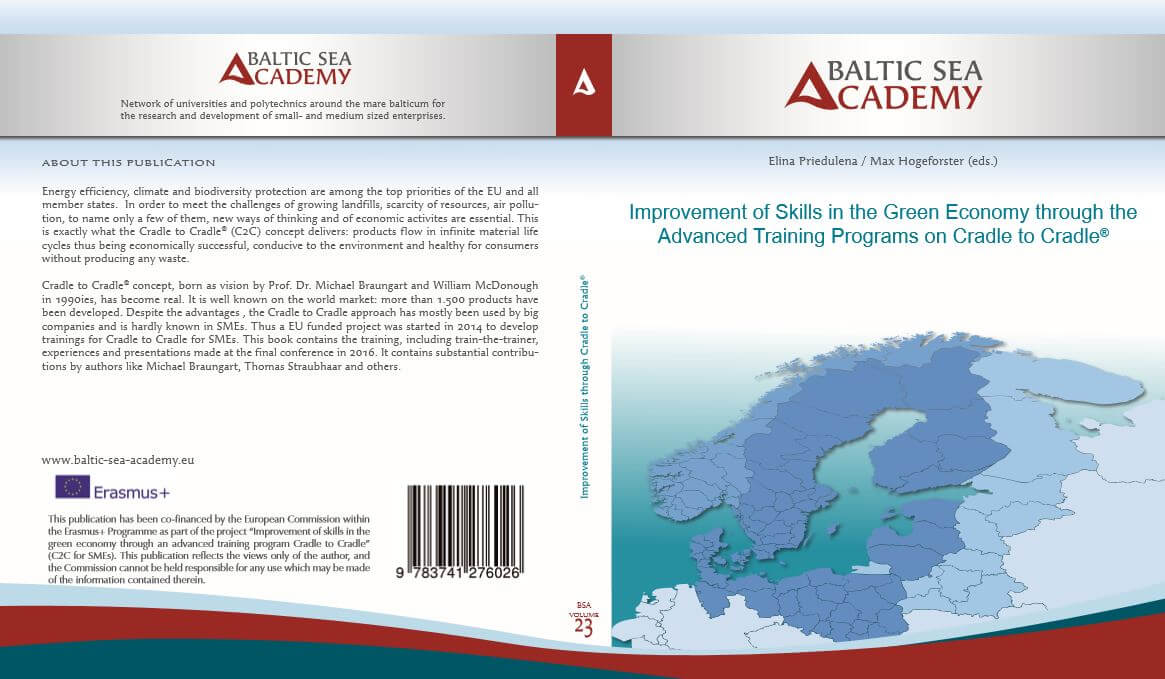
Energy efficiency, climate and biodiversity protection are among the top priorities of the EU and all member states. In order to meet the challenges of growing landfills, scarcity of resources, air pollution, to name only a few of them, new ways of thinking and of economic activities are essential. This is exactly what the Cradle to Cradle® (C2C) concept delivers: products flow in infinite material life cycles thus being economically successful, conducive to the environment and healthy for consumers without producing any waste. Cradle to Cradle® concept, born as vision by Prof. Dr. Michael Braungart and William McDonough in 1990ies, has become real. It is well known on the world market: more than 1.500 products have been developed. Despite the advantages, the Cradle to Cradle approach has mostly been used by big companies and is hardly known in SMEs. Thus a EU funded project was started in 2014 to develop trainings for Cradle to Cradle for SMEs. This book contains the training, including train-the-trainer, experiences and presentations made at the final conference in 2016. It contains substantial contributions by authors like Michael Braungart, Thomas Straubhaar and others.
The Hamburg Model – exemplary integration of youth into vocational education
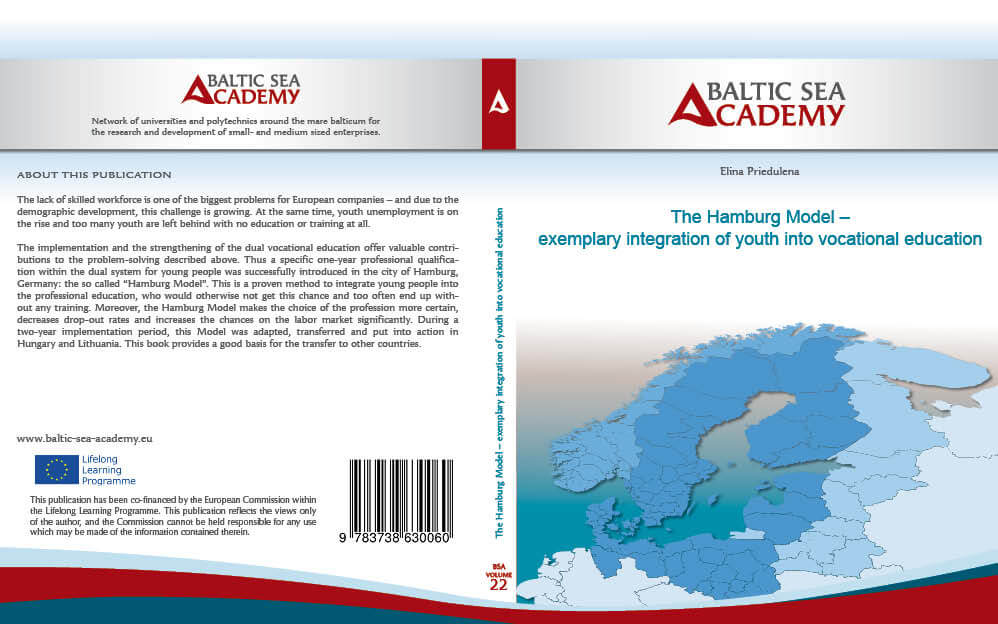
The lack of skilled workforce is one of the biggest problems for European companies – and due to the demographic development, this challenge is growing. At the same time, youth unemployment is on the rise and too many youth are left behind with no education or training at all. The implementation and the strengthening of the dual vocational education offer valuable contributions to the problem-solving described above. Thus a specific one-year professional qualification within the dual system for young people was successfully introduced in the city of Hamburg, Germany: the so called “Hamburg Model”. This is a proven method to integrate young people into the professional education, who would otherwise not get this chance and too often end up without any training. Moreover, the Hamburg Model makes the choice of the profession more certain, decreases drop-out rates and increases the chances on the labor market significantly. During a two-year implementation period, this Model was adapted, transferred and put into action in Hungary and Lithuania. This book provides a good basis for the transfer to other countries.
Work-based Learning around the Mare Balticum
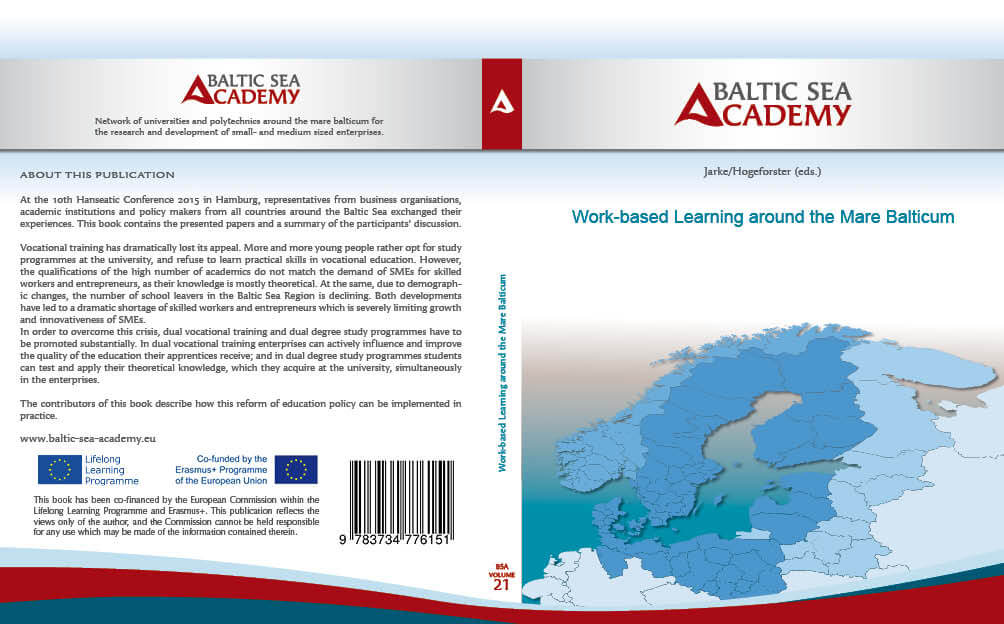
At the 10th Hanseatic Conference 2015 in Hamburg, representatives from business organisations, academic institutions and policy makers from all countries around the Baltic Sea exchanged their experiences. This book contains the presented papers and a summary of the participants’ discussion. Vocational training has dramatically lost its appeal. More and more young people rather opt for study programmes at the university, and refuse to learn practical skills in vocational education. However, the qualifications of the high number of academics do not match the demand of SMEs for skilled workers and entrepreneurs, as their knowledge is mostly theoretical. At the same, due to demographic changes, the number of school leavers in the Baltic Sea Region is declining. Both developments have led to a dramatic shortage of skilled workers and entrepreneurs which is severely limiting growth and innovativeness of SMEs.
Manual for trainings and dual study courses of the sector skills alliance “Skills Energy BSR”
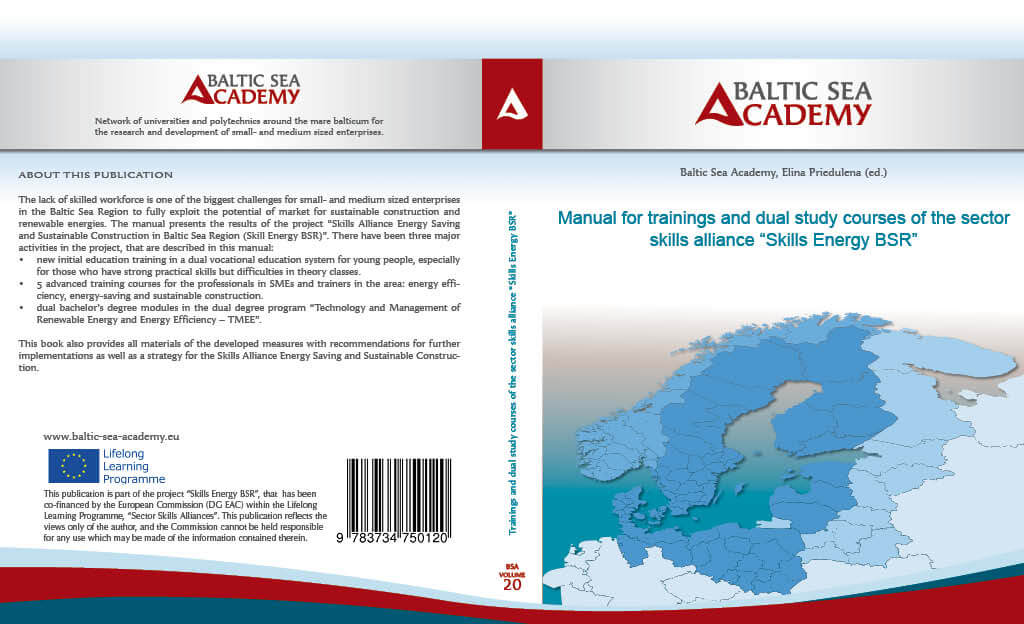
The lack of skilled workforce is one of the biggest challenges for small- and medium sized enterprises in the Baltic Sea Region to fully exploit the potential of market for sustainable construction and renewable energies. The manual presents the results of the project “Skills Alliance Energy Saving and Sustainable Construction in Baltic Sea Region (Skill Energy BSR)”. There have been three major activities in the project, that are described in this manual:
- New initial education training in a dual vocational education system for young people, especially for those who have strong practical skills but difficulties in theory classes.
- 5 advanced training courses for the professionals in SMEs and trainers in the area: energy efficiency, energy-saving and sustainable construction.
- Dual bachelor’s degree modules in the dual degree program “Technology and Management of Renewable Energy and Energy Efficiency – TMEE”.
This book also provides all materials of the developed measures with recommendations for further implementations as well as a strategy for the Skills Alliance Energy Saving and Sustainable Construction.
Female Entrepreneurship – Evidence from Germany and the Baltic Sea Region and analysis of women’s activity in SMEs in Poland
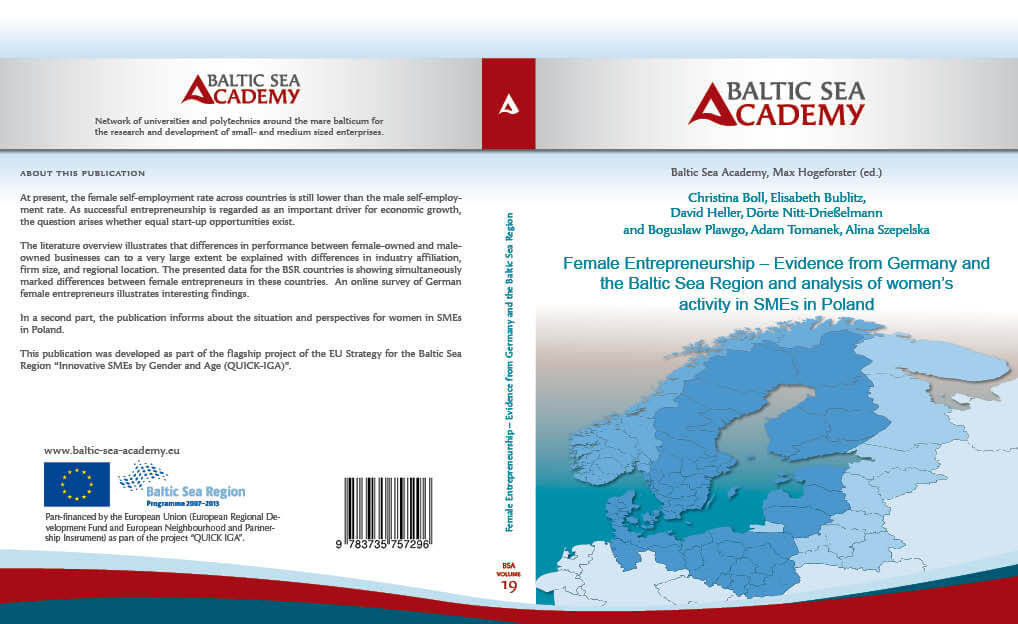
At present, the female self-employment rate across countries is still lower than the male self-employment rate. As successful entrepreneurship is regarded as an important driver for economic growth, the question arises whether equal start-up opportunities exist. The literature overview illustrates that differences in performance between female-owned and male-owned businesses can to a very large extent be explained with differences in industry affiliation, firm size, and regional location. The presented data for the BSR countries is showing simultaneously marked differences between female entrepreneurs in these countries. An online survey of German female entrepreneurs illustrates interesting findings. In a second part, the publication informs about the situation and perspectives for women in SMEs in Poland. This publication was developed as part of the flagship project of the EU Strategy for the Baltic Sea Region “Innovative SMEs by Gender and Age (QUICK-IGA)”.
Civilizational changes and the competitiveness of modern enterprises
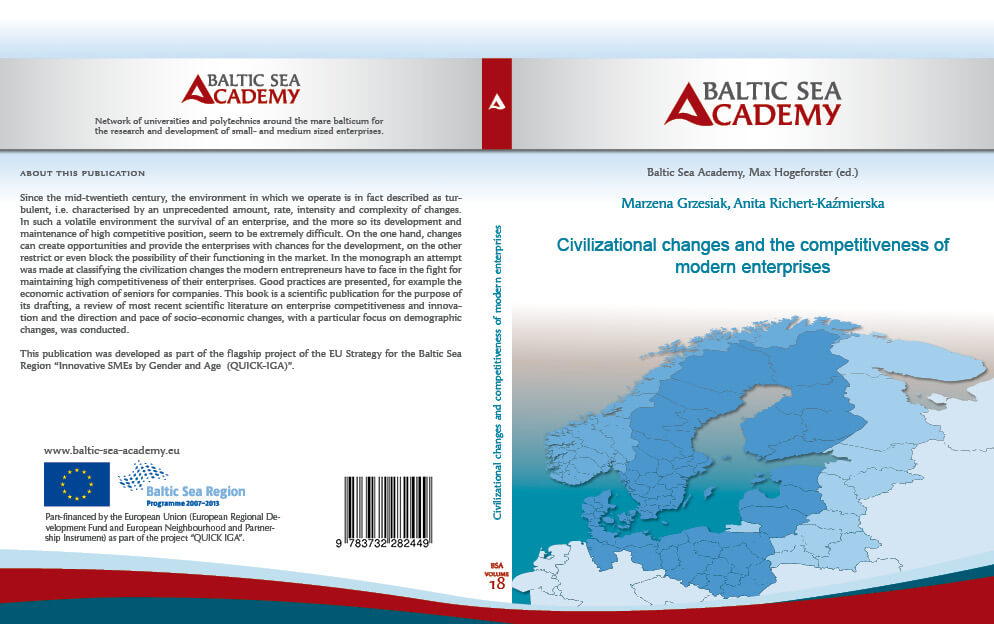
Since the mid-twentieth century, the environment in which we operate is in fact described as turbulent, i.e. characterised by an unprecedented amount, rate, intensity and complexity of changes. In such a volatile environment the survival of an enterprise, and the more so its development and maintenance of high competitive position, seem to be extremely difficult. On the one hand, changes can create opportunities and provide the enterprises with chances for the development, on the other restrict or even block the possibility of their functioning in the market. In the monograph an attempt was made at classifying the civilization changes the modern entrepreneurs have to face in the fight for maintaining high competitiveness of their enterprises. Good practices are presented, for example the economic activation of seniors for companies. This book is a scientific publication for the purpose of its drafting, a review of most recent scientific literature on enterprise competitiveness and innovation and the direction and pace of socio-economic changes, with a particular focus on demographic changes, was conducted. This publication was developed as part of the flagship project of the EU Strategy for the Baltic Sea Region “Innovative SMEs by Gender and Age (QUICK-IGA)”.
Manual for Innovative SMEs by Gender and Age in the Baltic Sea Region
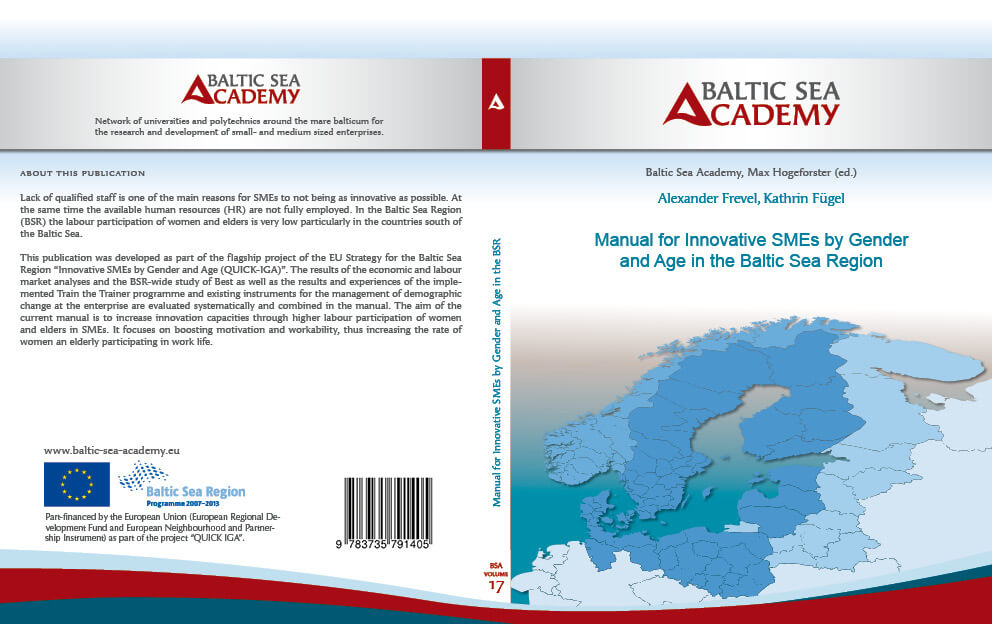
Lack of qualified staff is one of the main reasons for SMEs to not being as innovative as possible. At the same time the available human resources (HR) are not fully employed. In the Baltic Sea Region (BSR) the labour participation of women and elders is very low particularly in the countries south of the Baltic Sea. This publication was developed as part of the flagship project of the EU Strategy for the Baltic Sea Region “Innovative SMEs by Gender and Age (QUICK-IGA)”. The results of the economic and labour market analyses and the BSR-wide study of Best as well as the results and experiences of the implemented Train the Trainer programme and existing instruments for the management of demographic change at the enterprise are evaluated systematically and combined in the manual. The aim of the current manual is to increase innovation capacities through higher labour participation of women and elders in SMEs. It focuses on boosting motivation and workability, thus increasing the rate of women an elderly participating in work life.
Women and elderly on the BSR labour market – good practices‘ analysis and transfer
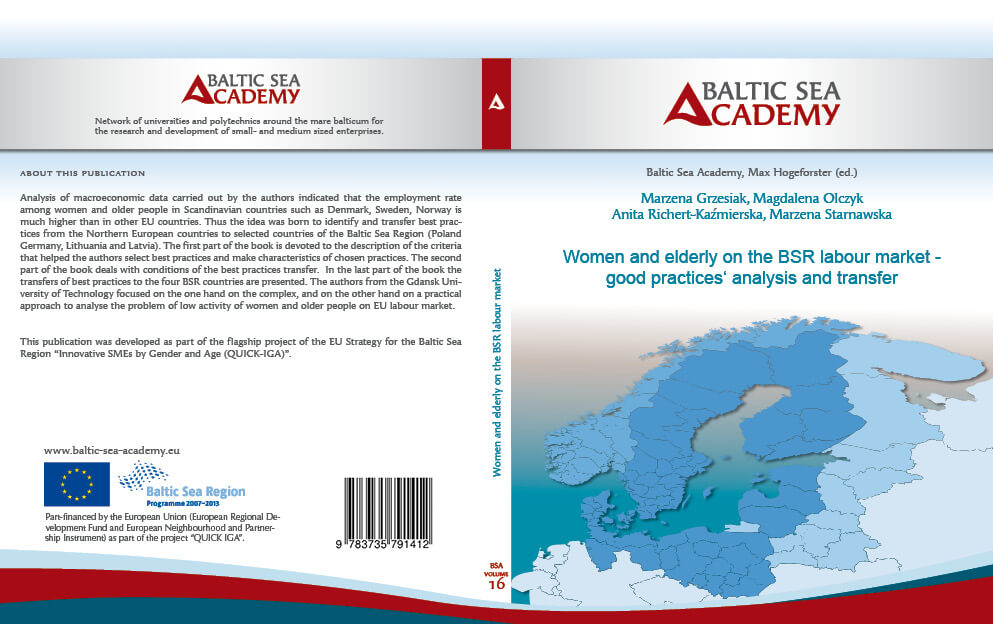
Analysis of macroeconomic data carried out by the authors indicated that the employment rate among women and older people in Scandinavian countries such as Denmark, Sweden, Norway is much higher than in other EU countries. Thus the idea was born to identify and transfer best practices from the Northern European countries to selected countries of the Baltic Sea Region (Poland Germany, Lithuania and Latvia). The first part of the book is devoted to the description of the criteria that helped the authors select best practices and make characteristics of chosen practices. The second part of the book deals with conditions of the best practices transfer. In the last part of the book the transfers of best practices to the four BSR countries are presented. The authors from the Gdansk University of Technology focused on the one hand on the complex, and on the other hand on a practical approach to analyse the problem of low activity of women and older people on EU labour market. This publication was developed as part of the flagship project of the EU Strategy for the Baltic Sea Region “Innovative SMEs by Gender and Age (QUICK-IGA)”.
Building the socially responsible employment policy in Baltic states
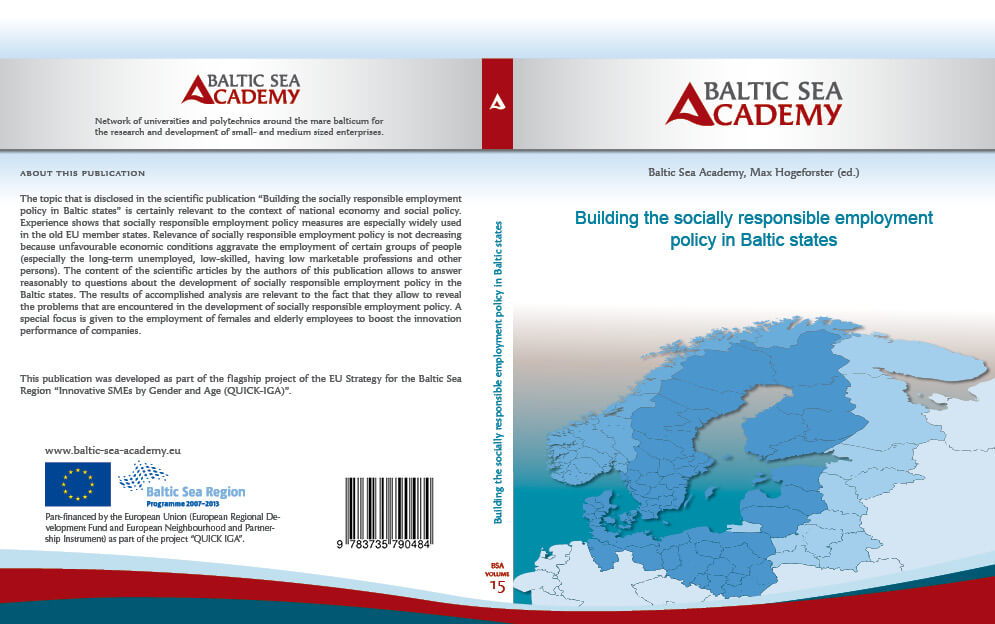
The topic that is disclosed in the scientific publication “Building the socially responsible employment policy in Baltic states” is certainly relevant to the context of national economy and social policy. Experience shows that socially responsible employment policy measures are especially widely used in the old EU member states. Relevance of socially responsible employment policy is not decreasing because unfavourable economic conditions aggravate the employment of certain groups of people (especially the long-term unemployed, low-skilled, having low marketable professions and other persons). The content of the scientific articles by the authors of this publication allows to answer reasonably to questions about the development of socially responsible employment policy in the Baltic states. The results of accomplished analysis are relevant to the fact that they allow to reveal the problems that are encountered in the development of socially responsible employment policy. A special focus is given to the employment of females and elderly employees to boost the innovation performance of companies. This publication was developed as part of the flagship project of the EU Strategy for the Baltic Sea Region “Innovative SMEs by Gender and Age (QUICK-IGA)”.
Projects on “Innovation in SMEs” in the Baltic Sea Region – Experiences and Perspectives
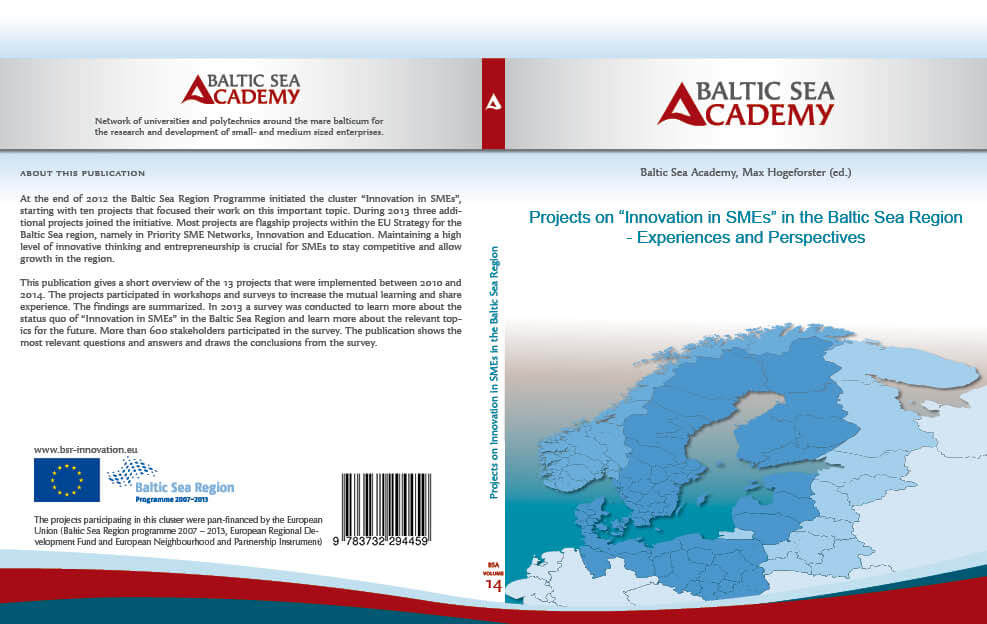
At the end of 2012 the Baltic Sea Region Programme initiated the cluster “Innovation in SMEs”, starting with ten projects that focused their work on this important topic. During 2013 three additional projects joined the initiative. Most projects are flagship projects within the EU Strategy for the Baltic Sea region, namely in Priority SME Networks, Innovation and Education. Maintaining a high level of innovative thinking and entrepreneurship is crucial for SMEs to stay competitive and allow growth in the region. This publication gives a short overview of the 13 projects that were implemented between 2010 and 2014. The projects participated in workshops and surveys to increase the mutual learning and share experience. The findings are summarized. In 2013 a survey was conducted to learn more about the status quo of “Innovation in SMEs” in the Baltic Sea Region and learn more about the relevant topics for the future. More than 600 stakeholders participated in the survey. The publication shows the most relevant questions and answers and draws the conclusions from the survey.
Innovative SMEs by Gender and Age around the Mare Balticum
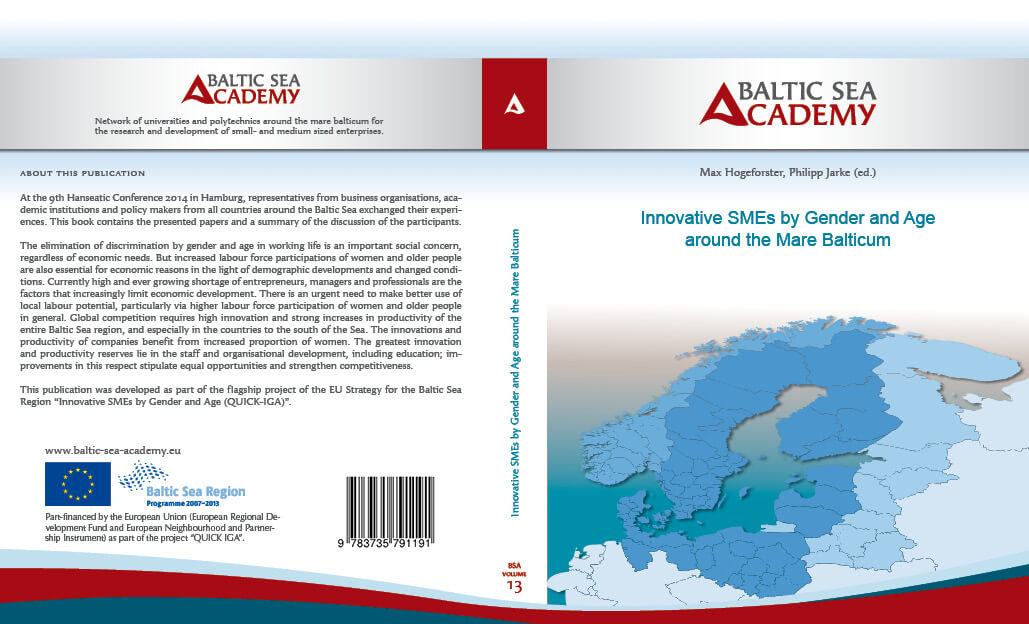
At the 9th Hanseatic Conference 2014 in Hamburg, representatives from business organisations, academic institutions and policy makers from all countries around the Baltic Sea exchanged their experiences. This book contains the presented papers and a summary of the discussion of the participants. The elimination of discrimination by gender and age in working life is an important social concern, regardless of economic needs. But increased labour force participations of women and older people are also essential for economic reasons in the light of demographic developments and changed conditions. Currently high and ever growing shortage of entrepreneurs, managers and professionals are the factors that increasingly limit economic development. There is an urgent need to make better use of local labour potential, particularly via higher labour force participation of women and older people in general. Global competition requires high innovation and strong increases in productivity of the entire Baltic Sea region, and especially in the countries to the south of the Sea. The innovations and productivity of companies benefit from increased proportion of women. The greatest innovation and productivity reserves lie in the staff and organisational development, including education; improvements in this respect stipulate equal opportunities and strengthen competitiveness. This publication was developed as part of the flagship project of the EU Strategy for the Baltic Sea Region “Innovative SMEs by Gender and Age (QUICK-IGA)”.
Age, Gender and Innovation – Strategy program and action plans for the Baltic Sea Region (2014)
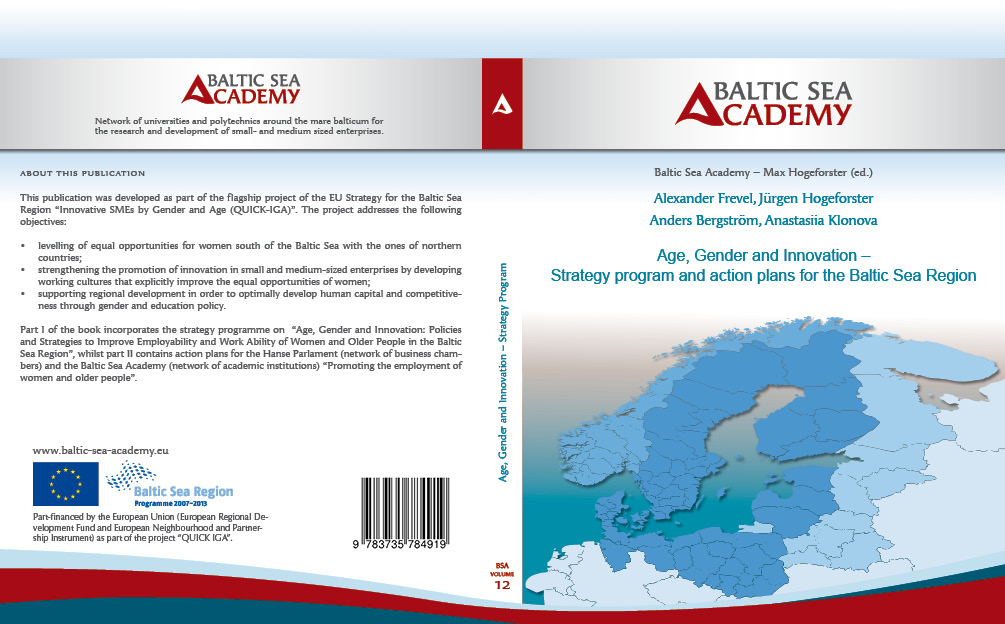
All countries in the Baltic Sea Region face a growing lack of skilled work force. However, the large potential of a better inclusion of females and elderly employees and managers remains often untapped. Also female and elderly employees can increase the innovation level of a company.
This publication provides strategies how to better include this important group in companies.
It was developed as part of the flagship project of the EU Strategy for the Baltic Sea Region “Innovative SMEs by Gender and Age (QUICK-IGA)”. The project addresses the following objectives:
– levelling of equal opportunities for women south of the Baltic Sea with the ones of northern countries;
– strengthening the promotion of innovation in small and medium-sized enterprises by developing working cultures that explicitly improve the equal opportunities of women;
– supporting regional development in order to optimally develop human capital and competitiveness through gender and education policy.
Development of the enterprises’ competitiveness in the context of demographic challenges
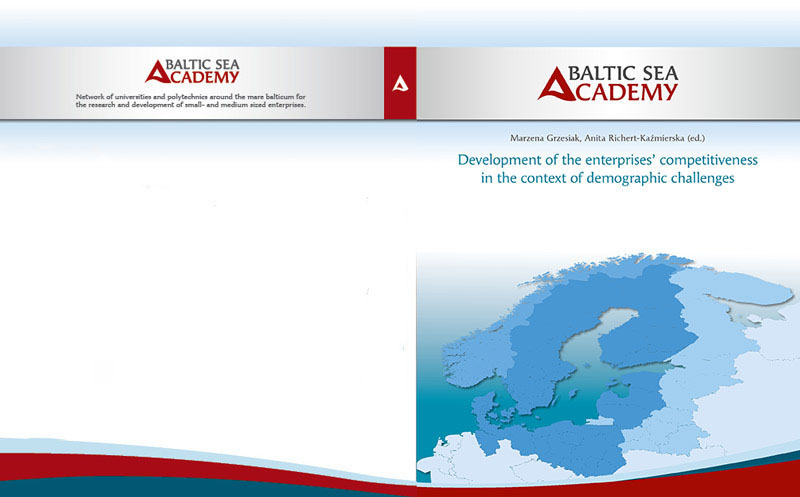
This publication relates to the subject of shaping and maintaining high competitiveness and innovation by businesses, with particular emphasis on the SME sector in the Baltic Sea Region. It is divided into three parts.
The first part includes the discussion of women’s economic activity and their participation in the creation and strengthening of the competitive position of companies.
The second part is devoted to problems related to the ageing of population in the Baltic Sea Region countries and the potential socio-economic impact of this fast growing process. The deliberations contained in the second part refer also to the possibilities and conditions for realizing the potential of seniors in the development of competitiveness and innovation of enterprises.
The third part is a fragmentary overview of achievements related to the factors of competitiveness and innovation of modern enterprises.
The papers, that were presented at a international conference 2013 at the Gdansk University of Technology, are printed in English.
Corporate Social Responsibility and Women’s Entrepreneurship around the Mare Balticum
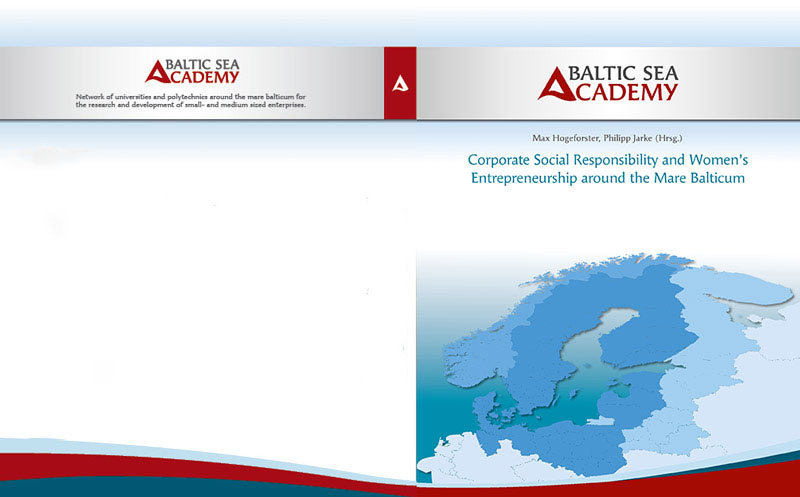
This publication relates to the subject of shaping and maintaining high competitiveness and innovation by businesses, with particular emphasis on the SME sector in the Baltic Sea Region. It is divided into three parts.
The first part includes the discussion of women’s economic activity and their participation in the creation and strengthening of the competitive position of companies.
The second part is devoted to problems related to the ageing of population in the Baltic Sea Region countries and the potential socio-economic impact of this fast growing process. The deliberations contained in the second part refer also to the possibilities and conditions for realizing the potential of seniors in the development of competitiveness and innovation of enterprises.
The third part is a fragmentary overview of achievements related to the factors of competitiveness and innovation of modern enterprises.
The papers, that were presented at a international conference 2013 at the Gdansk University of Technology, are printed in English.
Economic Perspectives, Qualification and Labour Market Integration of Women in the Baltic Sea Region
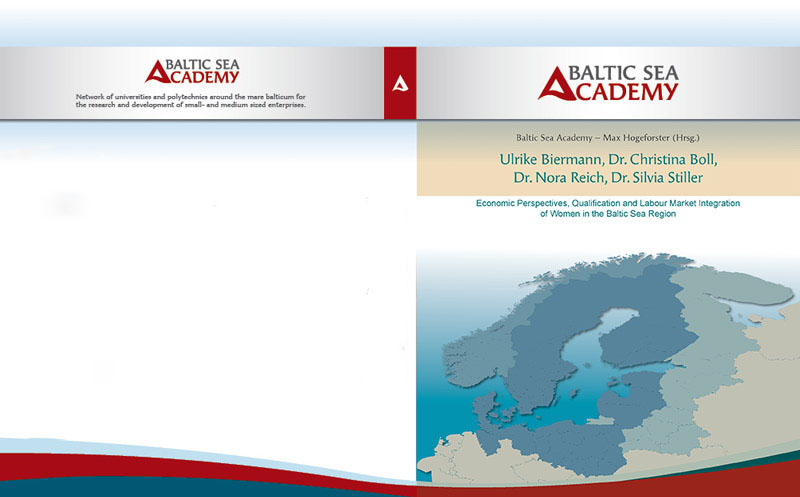
Demographic and economic structural change affect the development of the whole Baltic Sea Region in the future. Coping with these challenges requires initiatives aiming at labour market issues. A shrinking and ageing labour force entails the danger of shortage of labour supply in general while demand for skilled labour increases in the course of knowledge-based structural change. There are
large potentials for the Baltic Sea Region to strengthen its competitiveness by better tapping its human resources. Among these an advanced integration of women in the labour market is at the top of the agenda.
This book analyses the current economic and demographic structures in the Baltic Sea Region and assesses the development perspectives. In this context, it shapes the educational attainment and labour market involvement of women and points to considerable hidden potentials.
The Baltic Sea Academy is a non-profit network of 16 colleges and universities focusing on Education, Qualification and R&D for small and medium sized enterprises.
Strategy Programme for innovation in regional policies in the Baltic Sea Region
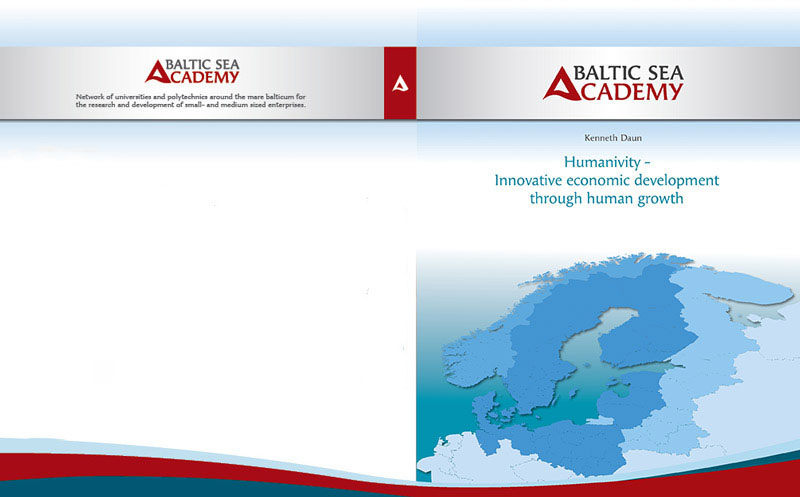
This book by Kenneth Daun illustrates clearly how important the human capital is for any company, in particular for small and medium-sized enterprises (SMEs), whose success strongly relies on the potential of the employees. The author describes how the human growth can influence an innovative economic development. He does not only explain his developed method for organisational innovation, but is also reflecting on a very practical way on three different case studies from South Sweden that he worked on for many years. It is underlined, that not much money needs to be invested to make a true change in a firm by boosting the innovation capabilities, but how companies, community and universities together can support such a growth.
Humanity – Innovative economic development through human growth by Kenneth Daun
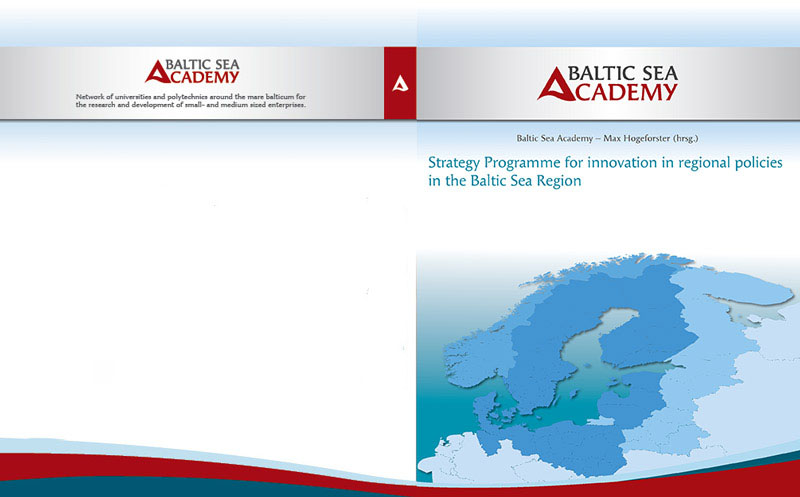
This publication gives an overview of the current state and development potential of the Baltic Sea Region and proposes a concrete strategy programme for innovation in regional policies. One prerequisites is a strong cooperation between the regions and states, but also the promotion of regional competition while preserving and strengthening the specific regional cultures around the Mare Balticum. For a competitive Baltic Sea Region, it is also essential that the regional policy supports the innovation in the small- and medium sized enterprises, since 99,8 % of all companies are SMEs and thus the economic and social backbone. A creation of real knowledge-alliances between universities, public administrations and businesses is highly recommended. These political strategies are the result of intensive discussions and experiences of a three year running project with 40 partners from 11 countries around the Baltic Sea Region, called BSR QUICK. They are adopted and recommended by the 47 Members of the Hanse Parlament and 16 Members of the Baltic Sea Academy.
The book contains the identical text of approx. 55 pages in English, German and Polish.
The book concentrates on
– Cooperation and integration
– Regional competition and fiscal equalization
– Equivalent living conditions and functional division of labor
– Independent cultures and regional self-esteem
– Endogenous potentials and smart specialization
– Regional economic cycles and intense range development
– Small and medium-sized enterprises and networks
– Innovation and knowledge partnerships
Decentralization and autonomy
Strategies and Promotion of Innovation in Regional Policies around the Mare Balticum
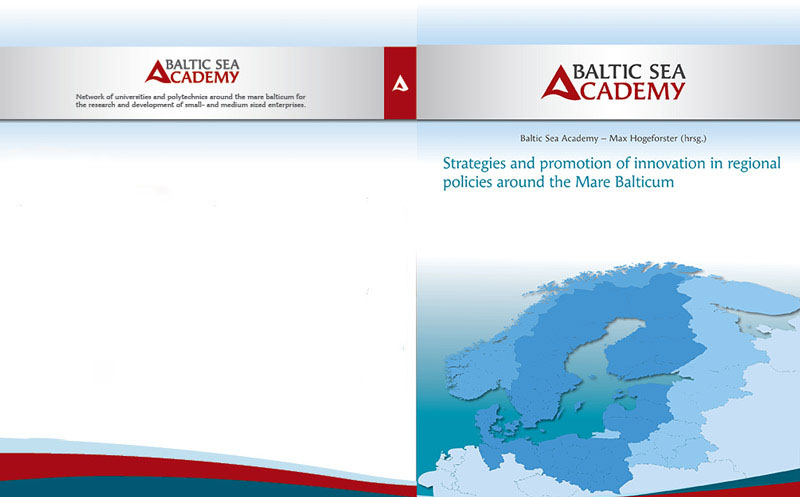
A sound promotion of innovation is essential for the future of the Baltic Sea Region, in particular to support the small- and medium sized enterprises.
For this purposes stakeholders from medium-sized businesses, science, politics, and administration met at the seventh Hanseatic Conference in May 2012 in Hamburg. For two days the participants discussed about “Innovation and innovative strategies in the regional policy around the mare balticum” to further strengthen the region. It became evident, that a sustainable promotion of innovation demands a closer cooperation within the regions, on a transnational level but also between administrations and especially between companies and R&D institutions. The Baltic Sea area will only be one of the most innovative and strong regions in the world, if the bordering countries build a unit. This publication included the presented papers and summarizes the discussion of the participants.
SME relevant sectors in the BSR: Personnel organisation, Energy and Construction
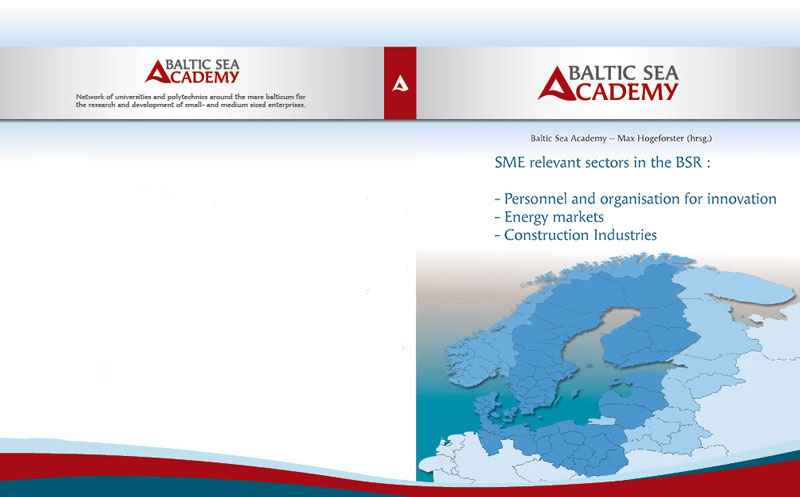
The 5th Volume of the Baltic Sea Academy book series takes a look at three sectors that are of particular importance for small and medium sized enterprises in the Baltic Sea Area:
– The University of Lund and the Gdansk University of Technology take a look at the potential for innovation from the development of personnel and organisation in companies
– The Chamber of Crafts Lublin gives an overview for the fields of Energy, Climate and Environmental protection
– The Technical University Vilnius compiled a report on a potential cluster for construction technologies in the Baltic Sea Region.
Energy Efficiency and Climate Protection around the “Mare Balticum”
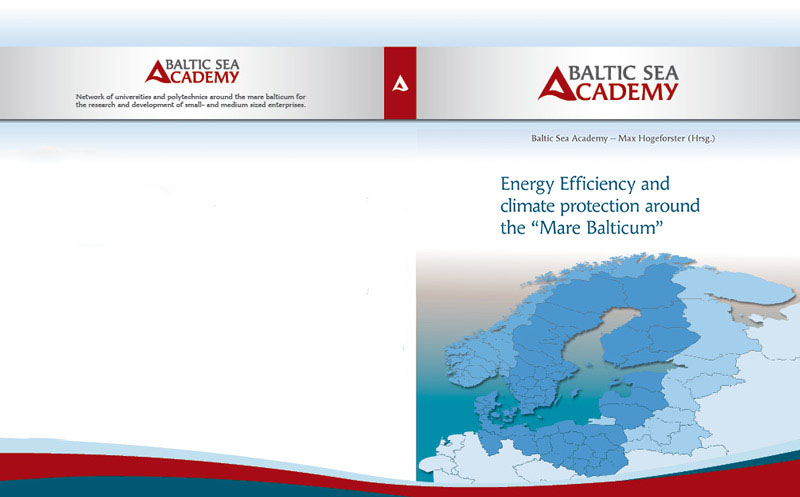
According to European and national schedules the Baltic Sea Region must cut its energy demand and greenhouse gas emissions dramatically within the next few decades. Substantial growth of renewable energy sources will be needed as well as a boost in energy efficiency. In this process small and medium sized enterprises (SME) play a key factor. The authors of this book – scientists, entrepreneurs and journalists – discuss how SMEs can make the best investment decisions to reduce their own energy consumption. Additionally the articles analyse new market opportunities opening up for SMEs, as implementing energy efficiency will happen mostly on a local level and on a rather small scale. For being able to seize these opportunities training and education of SMEs’ staff are essential.
The included texts are printed either in German or English.
Education Policy Strategies today and tomorrow around the “Mare Balticum”
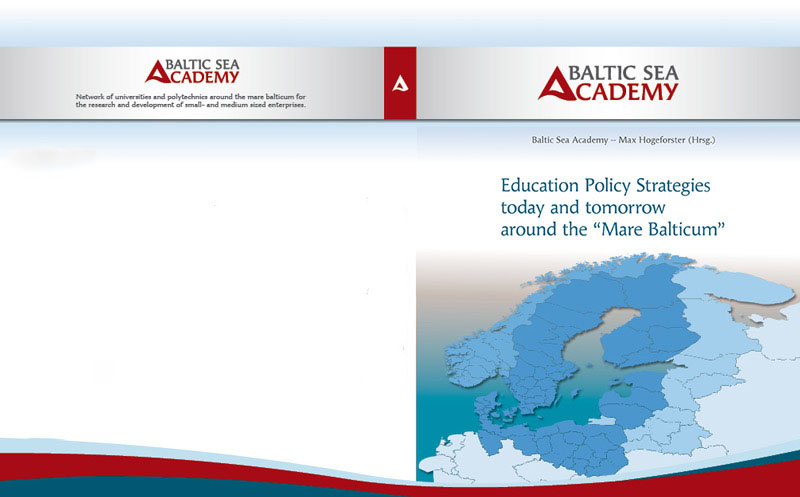
Knowledge and education are key factors for a successful future in modern, globalised times. This applies especially to the resource-poor Baltic Sea region and its small and medium sized enterprises. Without excellent qualified staff and executives they cannot compete on a global scale. The authors of this book – scientists, entrepreneurs and journalists – address the main problems of our education systems, ranging from schools to vocational training and universities. But not only do they analyse these diverse systems but also develop strategies for successfully meeting the challenges ahead of us.
Strategy Programme for education policies in the Baltic Sea Region (2nd edition)
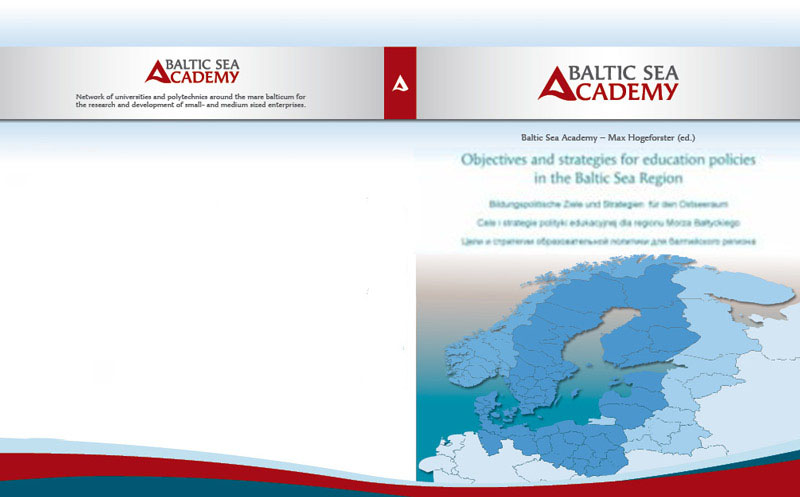
Objectives and strategies for education policies in the Baltic Sea Region The Baltic Sea Region is often considered the most innovative and economically strongest region of Europe. However, these strong developments and dynamics are at risk to face their limits. A rather high unemployment rate exists in many countries in the region, while at the same time, a lack of skilled work force is growing – which might indicate, that the existing qualifications are not in line with the actual demands. A strong commitment is needed from all countries around the Baltic Sea Region, in particular with respect to the most important pillar of any well-working system, the education policy. The whole region is clearly characterised by small- and medium sized enterprises (SMEs). To stay competitive on a global scale, these companies need employees with the best possible qualifications. The text included has been discussed and adopted by the Hanse Parlament, an umbrella organization of 50 Chambers of Crafts and/or Commerce , and the Baltic Sea Academy, a network of 16 academic institutions that closely cooperate for the benefit of SMEs in the region.This publication summarizes the opportunities and challenges to then provide concrete recommendations, from early childhood education, general education, vocational training and higher education.The book includes the identical text in English, German, Polish and Russian language.
Strategies for the development of Crafts and SMEs in the Baltic Sea Region
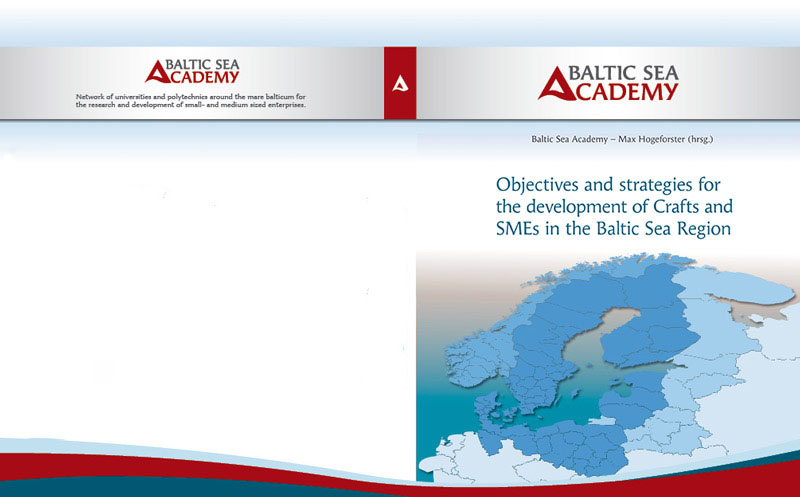
Kleine und mittlere Unternehmen haben einen großen Anteil an der Gesamtwirtschaft und Beschäftigung in Europa. 99 % aller Betriebe in der Europäischen Union sind kleine und mittlere Unternehmen; sie stellen etwa zwei Drittel aller Arbeitsplätze der privaten Wirtschaft in Europa. Im Ostseeraum sind diese Anteile noch ausgeprägter.
Als stabiler Gegentrend zur Globalisierung bilden sich immer stärker Regionalisierungen und Dezentralisierungen heraus. Davon kann der Ostseeraum als große Wirtschaftsregion mit den unterschiedlichen Kulturen, Stärken und Potenzialen seiner Teilregionen in besonderem Maße profitieren.
Das Buch gibt einen Überblick über die Situation der mittelständischen Wirtschaft im Ostseeraum und bietet strategische Empfehlungen für die Zukunft. Der Text ist nacheinander auf Englisch, Deutsch, Polnisch und Russisch enthalten.
